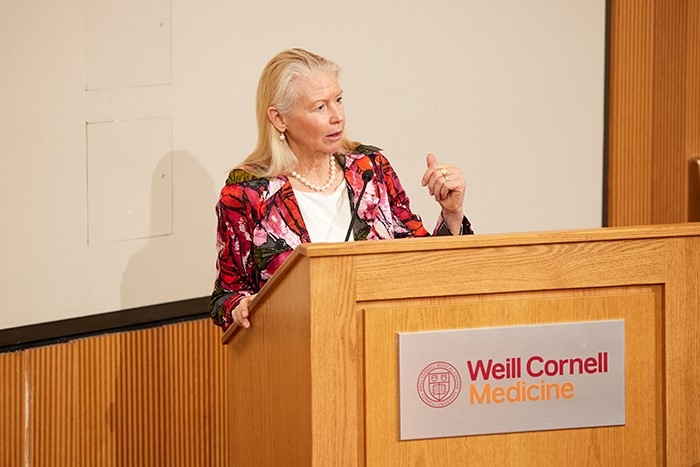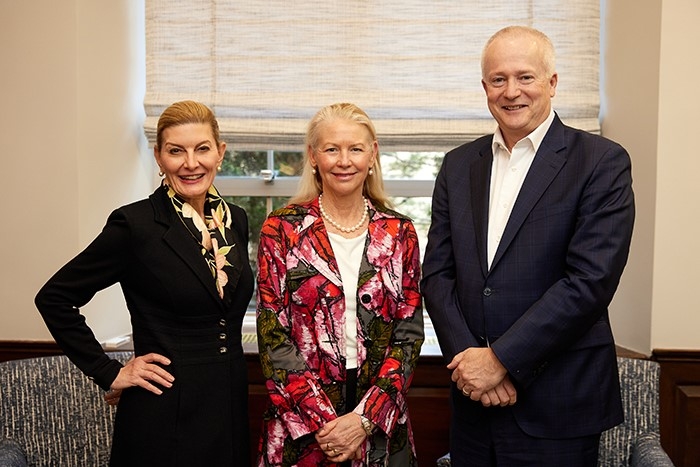Despite decades of halting progress, women’s cardiovascular disease diagnosis, treatment and outcomes continue to lag behind men’s, said Dr. C. Noel Bairey Merz, the Irwin and Sheila Allen Chair in Women’s Heart Research in the Smidt Heart Institute at Cedars-Sinai, in her keynote address on April 16 for Weill Cornell Medicine’s sixth annual Diversity Week.
“Females with no obstructive coronary arteries account for about a third of ischemic heart disease acute coronary syndromes. But when your arteries look like a guy, you get treated, and when your arteries look like a gal—meaning you look like you don’t have heart disease—there’s a surplus of deaths,” said Dr. Merz, who is also director of the Barbra Streisand Women’s Heart Center and the Linda Joy Pollin Women’s Heart Health Program at Cedars-Sinai. “Now we have something to chew on—we’ve started to have some evidence of a reason for the disparities in heart disease observed in women.”
Dr. Merz’s lecture, “Sex and Gender Medicine: Science, Policy and Health Disparities in CVD,” was part of a series of events to mark Diversity Week, which celebrates Weill Cornell Medicine’s commitment to greater equity, diversity, and inclusion in academic medicine and health care. She provided a sweeping overview of hers and others’ research, chronicling more than four decades of evolving insights into women’s heart health.

Dr. C. Noel Bairey Merz in Uris Auditorium.
Dr. Merz began by noting established physiological and social distinctions between women and men—including in hearing, pain response and symptom reporting—that suggested sex-related differences in cardiovascular disease would logically follow suit. By the 1980s, it was understood that cardiovascular disease was no longer solely “a man’s disease,” and organizations such as the American Heart Association (AHA) launched fledgling campaigns to increase awareness of women’s heart disease.
But including women in cardiovascular disease research largely “didn’t occur” to people until the 1990s, a disparity that still partially persists. After women were studied, scientists discovered key differences in how heart attack plaques arise in women compared to men.
“Women erode, and men explode in the heart arteries during heart attacks,” she said. “We thought we knew what caused heart attacks in the 1990s—plugged-up arteries.” But Dr. Merz’s WISE (Women’s Ischemia Syndrome Evaluation) study showed women’s plaques create tiny clots that generate “little, stuttering heart attacks…making women’s heart attacks harder to see and men’s easier to see—an important pathological difference.”
The findings provoked new imaging test techniques that could further delineate cardiovascular disease between the sexes as well as new sex-stratified treatment guidelines. Unfortunately, even with those strides—and additional AHA and NIH campaigns—women’s awareness of heart disease began declining. “The rate initially doubled, but has stalled,” she said.
Going forward, researchers need to generate data that is equitable for both sexes, she said. A push to “average out” statistics to reflect women and men has resulted in weaker treatment guidance for both. For example, research showing women begin to suffer heart attacks, strokes and heart failure at much lower blood pressure thresholds than men isn’t reflected in guidelines that categorize elevated blood pressure as 120 mm Hg/80 mm Hg or above.
“Women’s risks start going up at 110 (mm Hg) and men’s at 130 (mm Hg). We’ve averaged it to 120 (mm Hg) for the guidelines, so we’re not adequately serving women and we’re not adequately serving men,” she said.
Yet even 2018 data from more than 3,000 men and women ages 55 and under in the VIRGO study, which attempted to tease out why far more younger women die of their heart attacks than younger men, showed damaging gender-based differences in care, Dr. Merz said. “Women were more often shamed about their weight and less likely to be given effective therapy, such as cholesterol medication,” she said.
Scientists, cardiologists and others need to continue pressing to make cardiovascular research and care more equitable, Dr. Merz concluded.
“We just have to keep beating the drum, be patient and persistent,” she said. “It may not happen all in our lifetime, but we will have done the right thing.”

